Suchergebnisse für "Factsheet: Energietechnologien gestalten, die für alle sinnvoll und nutzbar sind"
Nachhaltig, baukulturell wertvoll und gemeinschaftlich Bauen
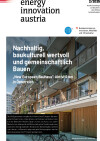
"New European Bauhaus"-Aktivitäten in Österreich
energy innovation austria
2/2025
Herausgeber: BMIMI gemeinsam mit dem Klima- und Energiefonds
Deutsch, 12 Seiten
Downloads zur Publikation
greening UP! Nachhaltige Grünpflege, Wartung, Instandhaltung von vertikalen Begrünungen inkl. rechtliche Aspekte
Im Projekt wurden aufbauend auf umfassenden Erhebungen und Analysen von bestehenden vertikalen Gebäudebegrünungen in Außenräumen (boden- und systemgebundene Fassadenbegrünungen) und vertikalen Innenraumbegrünungen passgenaue Grünpflege-, Wartungs- und Instandhaltungskonzepte erarbeitet und rechtliche Aspekte adressiert. Der "greening UP!"-Wissenspool mit konkreten Empfehlungen und anschaulich aufbereitetem Wissen sowie die Konzeption eines digitalen Tools zur "Ersten Grünen Hilfe" runden das Projekt ab.
K3 - Klimaneutrales Klinikum Klagenfurt
Im Zuge der Klimaneutralitätsambitionen der Landeshauptstadt Klagenfurt am Wörthersee liegt der Fokus auf der Entwicklung klimaneutraler Quartiere unterschiedlichster Funktionen und Nutzungen im Stadtgebiet. In Zusammenarbeit mit der Landeskrankenanstalten-Betriebsgesellschaft – KABEG wird ein Klimaneutralitätsfahrplan für das Quartier des Klinikum-Standorts Klagenfurt mit wissenschaftlicher Unterstützung der JOANNEUM RESEARCH Forschungsgesellschaft mbH entwickelt.
ResourceRevival - Quartiersentwicklung vom Industriestandort zur Ressourcenneutralität in Möllersdorf
Die Wiederverwendung von Bauelementen ist ein viel diskutiertes Thema, doch ein wirklich kreislauffähiges Quartier umfasst deutlich mehr. Durch die interdisziplinäre Zusammenarbeit im Rahmen einer co-kreativen Konzeptentwicklung am Standort Werk Möllersdorf werden bisher separat betrachtete Aspekte der Kreislaufwirtschaft vereint, Symbiosen zwischen Bedarf und Verfügbarkeit von Materialien, Energie, Regen- und Grauwasser identifiziert und deren Kreislaufführung maximiert.
New European Bauhaus: Jour Fixe Austria
9. July 2024
Architekturzentrum Wien (AzW), Museumsplatz 1, 1070 Vienna
Im Mittelpunkt der Veranstaltung standen der Austausch von nationalen und internationalen NEB-Aktivitäten und Positionen sowie die Vernetzung der Teilnehmer:innen.
passathon - RACE FOR FUTURE: Österreichs 775 Gebäude der Wärmewende per Fahrrad entdecken
20. März bis 30. September 2025
in ganz Österreich
Vom 20. März bis 30. September 2025 haben Radfahrer:innen und Architektur-Enthusiast:innen die Gelegenheit, Österreichs nachhaltigste Gebäude zu entdecken und gleichzeitig spannende Belohnungen zu sammeln. Der „passathon - RACE FOR FUTURE“ lädt zum siebenten Mal ein, mit dem Fahrrad durch das Land zu fahren, um 775 klimafitte Leuchtturmprojekte zu erkunden, ihre Eindrücke zu teilen und mit der Österreich radelt App wertvolle Preise zu gewinnen.
Digitale Transformation für größere Interaktivität in der TGA-Planung (digiaktiv)
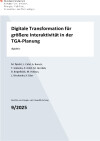
Das Projekt digiaktiv verfolgte, eine Verbesserung der Interoperabilität zwischen den unterschiedlichen Baugewerbegewerken durch neutrale, offene semantische Datenmodelle zu ermöglichen. Dabei trägt digiaktiv mittels digitaler Transformationsprozesse zur Steigerung der Planungsqualität und dem Betrieb von Bauwerken, sowie zur Minimierung des Schnittstellenrisikos bei.
Schriftenreihe
9/2025
M. Šipetić, J. Catal, A. Buruzs, T. Natiesta, P. Hölzl, M. Herzlieb, B. Beigelböck, M. Hollaus, L. Bischanka, K. Eder
Herausgeber: BMK
Deutsch, 62 Seiten
Downloads zur Publikation
PionierstadtDornbirn - Transformation der Stadt Dornbirn hin zu einer klimaneutralen Stadt
Das Projekt "PionierstadtDornbirn" zielt darauf ab, die Stadt Dornbirn hin zur Klimaneutralität zu transformieren. Es werden interne Kompetenzen aufgebaut, Prozesse verbessert und erste Umsetzungen vorangetrieben um die Dekarbonisierung der Stadt bis 2040 zu unterstützen.
BTTAB - Breitentest von energieeffizienten Demonstrationsgebäuden mit thermisch aktivierten Bauteilen
Noch nicht beforschte, bauteilaktivierte Gebäude in möglichst allen Bundesländern und Anwendungskategorien werden einem Monitoring unterzogen, welches neben Betriebsdaten auch Erfahrungen von Beteiligten miteinbindet. Ziel dieser Untersuchung ist es, die unterschiedlichsten Anwendungen der Technologie „Bauteilaktivierung“ allgemein zu betrachten sowie mit Hilfe von geeigneten Bewertungskriterien die Pilotprojekte zu bewerten und miteinander zu vergleichen.
KlimaschutzGleisdorf - Klimaneutralitätsfahrplan der Pionier-Kleinstadt Gleisdorf
Die Solarstadt Gleisdorf verfolgt bereits seit über 30 Jahren eine lange Tradition der Nutzung und Förderung erneuerbarer Energien.
StirliQ+ Komponentenentwicklung des Expansions-Stirling-Generators mit überkritischem Fluid als Arbeits- & Schmiermedium
Technische Erforschung und Weiterentwicklung von Details bzw. Komponenten des neuartigen StirliQ-Motors, der das Potential hat, die technischen Hürden herkömmlicher Stirling-Motoren zu überwinden. Anhand von Simulationen sowie einer Laboranlage erfolgt eine Eingrenzung der Prozessparameter hinsichtlich einer belastbare Vordimension von Apparatekomponenten.
EnerPHit für ein klimaresilientes St. Johann
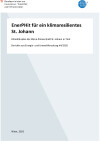
Klimafahrplan der Klima-Pionierstadt St. Johann in Tirol
Schriftenreihe
44/2025
Rainer Pfluger, Sascha Hammes, Andreas Frei, Hans Soder, Andreas Franze
Herausgeber: BMIMI
Deutsch, 92 Seiten
Downloads zur Publikation
P³Power - Plug&Play Storage of Photovoltaic Power
Im Projekt P³Power wird die Messtechnologie NetDetection (Abschätzung des Leistungsverbrauchs an einer Phase von einem beliebigen Messpunkt, z.B. einer Steckdose, in einem Haushalt) entwickelt. Auf Basis dieser Technologie werden plug&play Photovoltaik- und Speichersysteme realisiert, welche 100% Eigennutzung innerhalb beliebiger Aggregationsgrößen - vom Mehrfamilienhaus bis zur Gemeinde - ermöglichen ohne bestehende Installationen adaptieren zu müssen. Die Technologie wird digitalisiert, im Laborumfeld und in Realhaushalten getestet und zu einem umfassenden Energie-Service-Angebot weiterentwickelt.
PLAISIR - Planning Innovation: Lernen aus sozial innovativen Energieprojekten
PLAISIR analysiert sozial innovative Energieprojekte in strukturschwachen Regionen um deren Rolle in regionalen Energietransitionsprozessen zu verstehen und Empfehlungen für energieorientierte, endogene Regionalentwicklung formulieren zu können.
Lahof/Lanserhofsiedlung - Path to Zero CO2 - Klimaneutrales Demonstrationsgebäude im Bezug zum Quartier
Ziel ist die Entwicklung und Umsetzung eines innovativen, klimaneutralen Quartierkonzepts mit unterschiedlichen nachhaltigen Energie- und Gebäudetechnikkomponenten. Ein zentrales Element hierbei ist das klimaneutrale Demonstrationsgebäude in Holzbauweise. Dieses Gebäude wird mit einer thermischen Bauteilaktivierung im Massivholz ausgestattet und kombiniert innovative Energiekonzepte wie die Abwasserwärmerückgewinnung, große Photovoltaikanlagen und eine Wasserstoffanlage zur saisonalen Energiespeicherung.
Evaluierung visionärer Architekturkonzepte (EVA)
Prüfung bauphysikalisch und energetisch innovativer Gebäudekonzepte auf ihre Machbarkeit unter Monitoring und Evaluierung eines Mock-Ups
Lehmbau 2.0: Lehmbau der Zukunft - Handwerkskunst nach ingenieurwissenschaftlichen Ansätzen
Das Sondierungsprojekt untersucht die Eignung faseroptischer Sensorik zur langfristigen Überwachung von Formänderungsverhalten von Stampflehmwandelementen unter Feuchtigkeits- und Temperaturschwankungen (Schwinden) sowie Auflasten (Kriechen). Die experimentellen Erkenntnisse werden in ein Finite-Elemente-Modell zur Simulation des Versagensverhaltens unter Last integriert.
HPZ-Mauerwerk - Dämmstofffreie High-Performance-Außenwand aus Ziegelmauerwerk
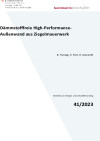
Um nachhaltige Quartiere in Ziegelbauweise realisieren zu können, muss die Festigkeit des thermisch optimierten Hochlochziegels verdreifacht werden. Dies soll durch Veränderung des Lochbilds, nämlich durch Verkleinerung des Luftspalts von 8 auf 4 mm gelingen. Ein erfolgreicher Projektabschluss bildet die Basis für dämmstofffreie, 8-geschossige Wohn- und Bürogebäude in Ziegelbauweise.
Schriftenreihe
41/2023
B. Freytag, H. Ferk, H. Gamerith
Herausgeber: BMK
Deutsch, 38 Seiten
Downloads zur Publikation
Speicher-Kaskade MZ: Kaskadiertes Speichersystem zur Etablierung von urbanen Plus-Energiesysteme am Beispiel der Stadt Mürzzuschlag
Im Projekt „Speicher-Kaskade MZ“ sollen Batteriespeichersysteme auf unterschiedlichen Netzebenen der Stadt(werke) Mürzzuschlag implementiert werden, deren Messdaten ein integriertes Netzmonitoring ermöglichen und den Grundstein für den weiteren Ausbau der Photovoltaik (PV)-Nennleistung vor Ort schaffen.
Zukunftsquartier 2.0 - Replizierbare, thermisch und elektrisch netzdienliche Konzeption von (Plus-Energie-) Quartieren im dichten urbanen Kontext. Weg zum Plus-Energie-Quartier in Wien
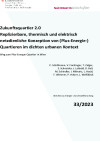
Entwicklung eines replizierbaren Konzepts zur netzdienlichen Integration von innovativen (Plus-Energie-) Quartieren mit hoher Vor-Ort- Energieaufbringung in die bestehende Netzinfrastruktur (Strom- und Fernwärmenetz).
Schriftenreihe
33/2023
P. Schöfmann, V. Forstinger, T. Zelger, S. Schneider, J. Leibold, D. Bell, M. Schindler, I. Mlinaric, L. Hackl, F. Wimmer, P. Holzer, L. Weißböck
Herausgeber: BMK
Deutsch, 212 Seiten
